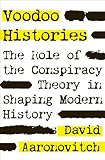Reflections by Dr. Gregory Klages on non-fiction books dealing primarily with politics, history, and religion. Significant attention to Canadian content. Mail me/comment if you read anything. I love to hear feedback!
Monday, 20 June 2011
David Aaronovitch, "Voodoo Histories: The Role of the Conspiracy Theory in Shaping Modern History" (2009)
Christopher Hart nicely summarizes the message of the book in the 3 May 2009, (London, U.K.) Sunday Times.
"Voodoo Histories is... much more than a prolonged sneer at human folly, ignoble fun though that always is. It is also a serious inquiry into why conspiracy theories appeal, and Aaronovitch’s theories are consistently reasonable, persuasive and humane. The complexity of our society is clearly a factor, and the frigid non-humanity of so many of our transactions. Real connections are few and far between, so some people start to invent their own."
The text explores a number of popular 20th-century conspiracy theories, as well as some that are more obscure (or at least obscure outside of the UK). No surprises that significant chapters or portions of chapters are devoted to: the Protocols of the Elders of Zion, Pearl Harbour, the Kennedy assassinations, the death of Marilyn Monroe, speculations around the book Holy Blood, Holy Grail, and 9/11. I was a bit surprised to discover that there was not a chapter dealing with speculations surrounding the first moon landing (or all of them?) being faked.
I would have preferred that Aaronovitch spent a bit more time trying to understand in some more objective sense the reasons for conspiracy theory creation, and the popularity of the practice in 20th-century societies. He does tackle this, but usually as a bit of an aside alongside his explorations of particular conspiracy speculations. My desire for such a chapter, however, may stem more from wanting this book to read like an academic text, rather than a book for a popular audience.
Aaronovitch closes the book with a few key claims regarding conspiracy theories:
1) "[c]onspiracy theories originate and are largely circulated among the educated and middle class" (338)
2) "overarching theories are formulated by the politically defeated and taken up by the socially defeated, deriving 'from the concrete experience of modernity by losers who will not go softly into the night but instead rage against it.' ...If it can be proved that there has been a conspiracy... then their defeat is not the product of their own inherent weakness or unpopularity, let alone their mistakes; it is due to the almost demonic ruthlessness of their enemy." (340)
3) "the possibility that conspiracy theories are history as written by the losers confers a kind of underdog's truth upon them." (342)
4) Conspiracist fantasies are "much more problematic when the theorist is someone who is seen as being repulsive or dangerous and/or whose targets are people like yourself." (346)
5) "That conspiracism is, at bottom, a symptom of paranoia subsequently became an anti-conspiracist cliche, and it's easy to see why. In modern society, paranoia seems omnipresent. (351) ... this impulse to grasp half-baked and damaging but attractive notions of why the world is as it is could be replaced through emotional literacy." (352)
6) Humans are intolerant of ignoring important causes. We invent stories to explain important events, even when they cannot be tested against - or test poorly against - reality. (354)
Subscribe to:
Post Comments (Atom)

No comments:
Post a Comment